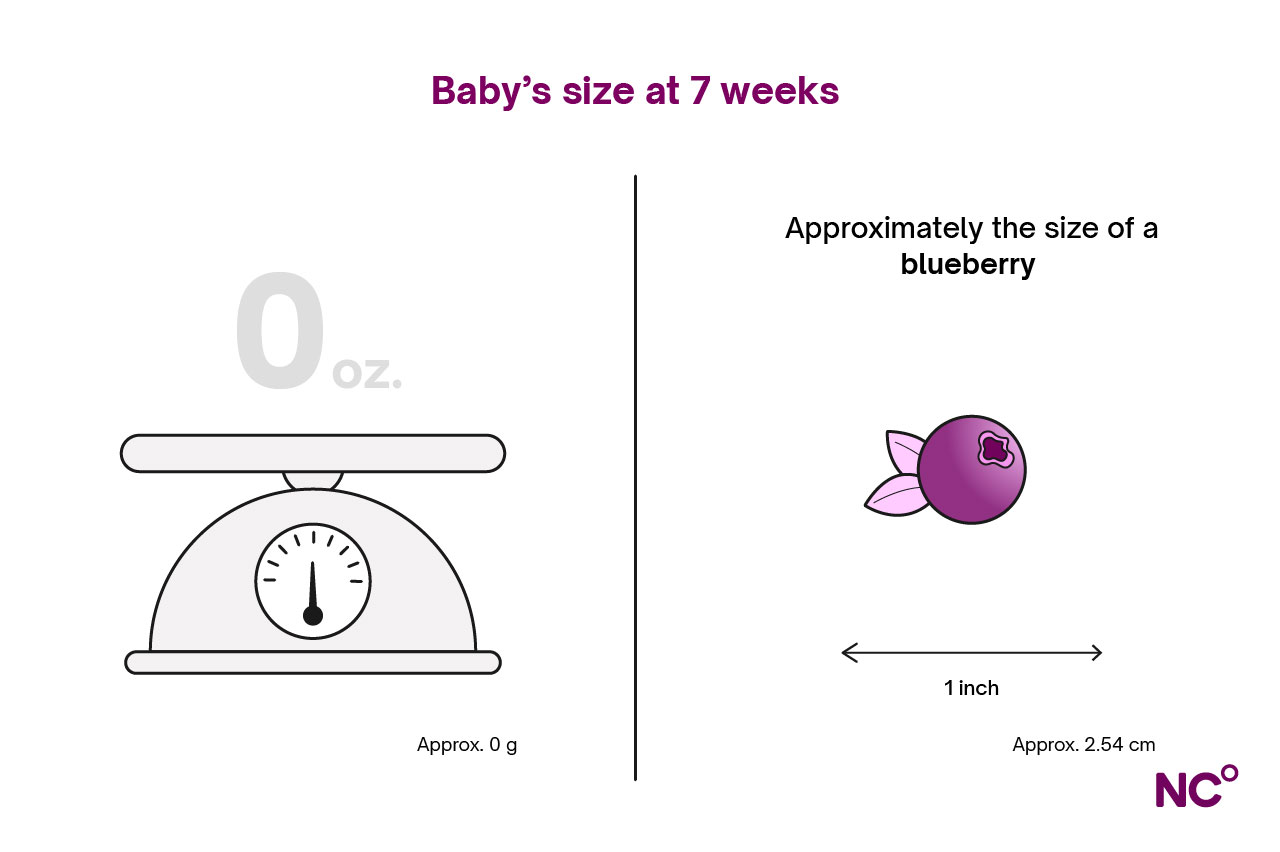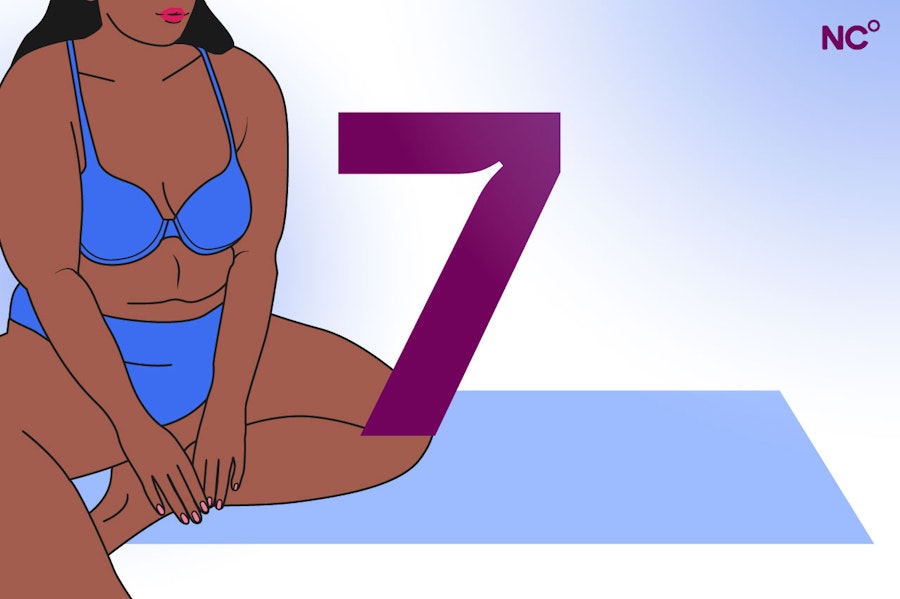7 weeks pregnant: pregnancy symptoms & tips
Follows NC° Editorial Policy
At Natural Cycles, our mission is to empower you with the knowledge you need to take charge of your health. At Cycle Matters, we create fact-checked, expert-written content that tackles these topics in a compassionate and accessible way. Read more...
Key Takeaways
- Week seven can bring some noticeable physical and emotional changes
- Your week 7 pregnancy symptoms may include breast changes, changes to your skin and hair, light aches and pains, and more
- The embryo is growing rapidly — it’s developing 100 new brain cells each minute, and its heartbeat is now detectable on an ultrasound
- Supporting your physical and emotional health now can help lay the foundations for the months ahead
Welcome to week seven of your pregnancy! You’re nearing the end of month two. In this article, we’ll go over a few common early pregnancy symptoms you may be experiencing this week.
Then, we’ll explore how your baby is developing at seven weeks pregnant, and close out with some helpful tips to support your body and growing baby this week.
But first, a quick reminder that every pregnancy is unique. The symptoms and experiences detailed below may happen for you sooner or later than exactly at week seven, and it’s equally possible that you may not experience any early symptoms at all [1]. This guide is meant to give generalized information and advice, and should not be substituted for care from your medical team.
Pregnancy symptoms at week 7
During week seven, there are many changes happening in your body due to rising pregnancy hormones. There is more blood pumping throughout your entire system than there was prior to pregnancy (fun fact: your total blood volume will increase by 50% as the pregnancy progresses!). This extra blood flow will help fuel the growth and development of the new baby [2]. Let’s get more specific about what you may be feeling in terms of seven-weeks-pregnant symptoms.
Baby bump status
Your uterus is probably about the size of a lemon, but you might not see a baby bump just yet. If it’s your first pregnancy, you may not notice a bump until around week 12, although you may experience some bloating before then. If you’ve been pregnant before, you may notice your bump earlier [2].
Breast changes
Your breasts are developing tissue that will make and store breast milk, so you may notice that they feel more tender and swollen during week seven [1]. The nipples and areola may also become larger and darker. If it’s becoming uncomfortable, it might be time to consider a supportive maternity bra [3].
Changes to skin and hair
You might notice some dark, brown patches on your face or a darkening of the skin overall. This phenomenon is known as melasma, or hyperpigmentation. Your hair may also start to appear thicker and shinier, giving you some of that well-known pregnancy “glow” [2].
Constipation
Some people struggle with constipation around week seven [3]. About two in five women experience constipation during pregnancy due to hormonal changes, new medicines or supplements, or lifestyle changes like diet and exercise habits. Staying hydrated, exercising regularly, and getting plenty of fiber in your diet can help, but see your healthcare provider if symptoms don’t ease or are causing you significant discomfort [4].
Fatigue
It’s common to feel extra fatigued during the early weeks of pregnancy, whether that’s needing more sleep each night, or dealing with sleep disturbances that lead to tiredness during the day. You may also not be able to be quite as present in your day-to-day as you were previously, or you might not be able to participate in some activities you used to enjoy due to fatigue. This is entirely normal as your body adjusts to the changes that come with pregnancy, so try to be kind to yourself as you navigate these changes. Fatigue usually eases up in the second trimester, but may return in the third trimester as you approach birth [5].
Frequent urge to pee
As your uterus grows during early pregnancy, you may find yourself needing to use the bathroom more frequently. The growing uterus pushes on the bladder, increasing the urgency and frequency of urination [1].
Heightened sense of smell and taste
At week seven, you may notice strange smells and tastes that you never picked up on before. Some people report a metallic taste in their mouth, along with new cravings and aversions to certain foods. You may also notice a heightened sense of smell [2].
Morning sickness usually starts by week six of pregnancy, so you’ll probably be feeling nauseous and potentially vomiting throughout the day (yes — despite the name “morning” sickness, nausea can happen at any time of day or during the night, and the nausea may or may not be accompanied by actual vomiting) [2]. While uncomfortable, this is a very common pregnancy symptom. Estimates suggest that about 70-80% of pregnant people experience some sort of nausea or vomiting during pregnancy [6].
Light aches and pains
Some people experience mild cramping in early pregnancy, which may feel a bit like period cramp pains. Others have reported light headaches as well. Though mild pain and cramping in the abdomen are common during pregnancy and usually nothing to worry about, they can sometimes indicate that something more serious is going on. If you experience regular cramping or tightening in the pelvis/stomach region, or if you’re experiencing pain that is disruptive, we recommend making an appointment with your health care provider promptly [2].
Mood swings
Pregnancy hormones affect everyone a bit differently, but they can affect your mood along with your mental and emotional health. It’s common to feel down one minute and happy the next, so you may be on more of an emotional roller coaster than usual. While these changes are common, they can be quite difficult to navigate and manage, so try to take it easy on yourself during this time [1].
Talking to a trusted friend, family member, or therapist can help lighten the emotional load. Gentle breathing exercises may also help calm your nervous system, and although it may seem small, finding relaxation methods that work for you now can support you through the rest of the pregnancy. If stress is interfering with your daily life, reach out to a healthcare provider [2].
Your baby’s development at 7 weeks
Internally, while your uterus is about the size of a lemon, the embryo is about 10mm long, or about the size of a grape [2]. It’s surrounded by an amniotic sac, which is a fluid-filled pouch made of delicate tissue that provides it with the nutrients it needs to grow. Let’s dive into the changes and developments happening with the embryo at week seven [3].
Arms and legs: Small buds that will eventually become limbs are forming at this time. They’re forming cartilage first, and the arms typically grow longer before the legs. Flattened ends, at the ends of the arms, will become the hands [2].
Blood flow: The embryo’s blood is now pumping through its main vessels (similarly to how your body is pumping extra blood throughout your body!) [7].
Bone formation: In addition to the limbs, tissue is now growing that will eventually become the spine and other major bone structures [7].
Brain: The embryo’s brain is growing much faster than the rest of the body — in fact, it’s generating about 100 new brain cells each minute [2]. The brain is forming into five different areas, and some cranial nerves may be visible now [7].
Eyes and ears: The foundation for the baby’s eyes and ears are forming now as well [7].
Heartbeat: The heart is now beating at a regular rhythm and can be detected via vaginal ultrasound [7]. It’s likely beating at around 150-180 beats per minute [3].
Organ foundations: Foundations for the internal organs are also developing, which include the stomach, kidneys, and lungs [3].

Note: We’ll often refer to your baby as an “embryo” in these early pregnancy articles. While the pregnancy timeline is typically divided into three trimesters, fetal development is divided into four stages. Your baby is technically considered an embryo until week eight — about halfway through those four stages. Learn more about the difference between an embryo and a fetus here.
Tips for you at 7 weeks pregnant
Stay hydrated
With the extra blood circulating in your system and the energy you’re expending to support the growing embryo, it’s important to stay as hydrated as possible. You may feel thirstier than normal, and you’ll want to drink at least eight glasses of water a day (this can include teas and juices) [2].
Stay on top of your vitamins
It’s important to take prenatal vitamins at this time during your pregnancy. These provide the right mix of vitamins, minerals, and nutrients needed to support your body and baby as the pregnancy progresses. Similarly, it’s recommended to take about 400mcg of folic acid every day of pregnancy until at least week twelve, but talk to your healthcare provider about specific dosages and recommendations. They may also recommend vitamin D and an iron supplement depending on your unique needs [2].
See your healthcare provider
At week 7, it’s a good time to book your first appointment with your midwife or physician. These generally take place around weeks eight to 12. They’ll discuss your options for birth, testing, and dating the approximate due date [2].
Exercise
While the recommendation is about 150 minutes of exercise per week during pregnancy, everyone’s journey is unique. Your body may respond in different ways to different types of exercise, and you may find even a small amount of movement challenging. You can break down that recommendation and do any kind of movement that feels good for about 20 minutes a day — even if it’s a brisk walk or some gentle stretching [3].
Eat Healthy
These early weeks are a good time to figure out what works best for your diet during pregnancy as well. You may feel certain cravings or strong aversions to certain foods, but as long as you’re getting plenty of fruits and vegetables and consulting your healthcare provider about your specific dietary needs, you’re in good shape. They may recommend that you stay away from any unpasteurized dairy products and/or raw types of meats and cheeses [8].
Plenty of rest
As we mentioned earlier, fatigue is very common in these early weeks of pregnancy. With that in mind, make sure you’re carving out plenty of time for rest. This may mean going to bed early, naps during the day, and asking for assistance with certain responsibilities like childcare [3].
Support your mental and emotional health
If you're feeling low, anxious, or stressed, reach out to your healthcare provider, a therapist, or your support network. It's normal to experience a wide range of emotions during pregnancy, and help is available to support you through them [1].
Get support on your pregnancy journey with Natural Cycles
Lots of changes are happening for both your developing baby and your changing body at seven weeks pregnant. While individual symptoms vary, focusing on rest, nourishment, and emotional support can help you navigate this stage and beyond. If you’re curious to learn more about what’s happening in your body during pregnancy, see if Natural Cycles Follow Pregnancy can be a useful tool. You can then seamlessly transition the app to NC° Postpartum to support your recovery after childbirth as well.
Did you enjoy reading this article?
